The final date for receiving any further funding applications related to UoA25 research development for this year (see earlier posts for details) will be Wednesday 18th May.
Yearly Archives / 2016
FMC Cross-Departmental Seminar Series 11 May 2016
Communicating Research
FMC Cross-Departmental Seminar Series 2015-16
The Faculty of Media and Communication at BU
Venue: W240, Weymouth House, Talbot Campus, Bournemouth University, Fern Barrow, Poole, Dorset, BH12 5BB
Wednesday 11 May 2016, 3pm, W240
A Centre for Politics and Media Research Guest Lecture
Maria Rovisco, Department of Media and Communication, University of Leicester
Picturing the Square: the Indignados Social Movement, Pop-up Democracy and the Occupied Square
This paper is concerned with how the indignados social movement (also known as M15) used particular forms of symbolic communication to articulate their collective self-representation as a movement of global citizens. Using a cultural sociology approach, I argue that in their public communication the indignados use the image of the ‘occupied square’ as a symbol of democracy ‘from below’ to transcend the local and address a global public of equally disaffected ordinary citizens. City squares became a stage for a political theatre in which the indignados go on to articulate their democratic struggles and a new way of doing politics outside formal politics, which is highly performative, and constitutive of their collective identity. Drawing upon Hariman and Lucaites’s (2007) conception of iconic image, we will see that the image of the occupied square resonates with global audiences because its meanings tap on a repertoire of culturally shared representations of non-violent occupations of urban space in the twentieth-century (e.g., Tiananmen Square, the civil rights sit-ins) that is powerfully embedded in western public memory. Through semiotic analysis of visual material (maps, photos, posters, image memes) and discourse analysis of public documentation (e.g., pamphlets, manifestos) available in the blogs of the encampments of Lisbon, Barcelona and Madrid, I will show how the occupied square can be understood both as a model of dissent and democratic participation, which becomes available for global circulation when it is picked up and amplified by the media.
About the series
This new seminar series showcases current research across different disciplines and approaches within the Faculty of Media and Communication at BU. The research seminars include invited speakers in the fields of journalism, politics, narrative studies, media, communication and marketing studies. The aim is to celebrate the diversity of research across departments in the faculty and also generate dialogue and discussion between those areas of research.
Contributions include speakers on behalf of
The Centre for Politics and Media Research
The Centre for the Study of Journalism, Culture and Community
Promotional Cultures & Communication Centre
Public Relations Research Centre
Narrative Research Group
Journalism Research Group
Advances in Media Management Research Group
Kind Regards,
Brian
Brian McNulty
Research Development Co-ordinator
Faculty of Media & Communication
The Loft (P181), Poole House, Talbot Campus
Fernbarrow, Poole
BH12 5BB
(+44 (0)7834 154984
Office Hours: Monday-Friday 8:00-16:30
Join us on: Facebook |Twitter |YouTube |LinkedIn
Final 3 Minute presentation (3MP) event for the 2015/16 academic year
Dear all,
3MP is back for the final time for this academic year. This event challenges postgraduate researchers to talk about their research in 3 minutes and is designed to expose the audience to a variety of ideas from different disciplines in a bitesize way. There will be plenty opportunities to meet like-minded individuals and to create new connections among staff and colleagues across the University.
Just to give you a small sample of what to expect we have talks about:
- Midwifery
- Diabetes & lifestyle
- Hacking & Gaming Technology
- Corporate governance
- Nature Conservation
- and much more!!
The event will commence on Thursday 19th May from 18:00 on Talbot Campus.
To attend – book your 3MP ticket here
We hope to see you there!
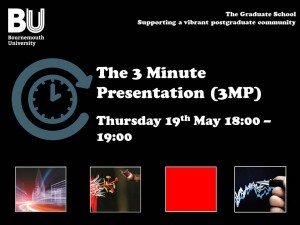
Opportunity to receive updates on knowledge exchange and innovation (AURIL Membership)

Association for University and Research Links (AURIL) is the professional association representing all practitioners involved in knowledge creation, development and exchange in the UK and Ireland who work to ensure that new ideas, technologies and innovations flow from their institution into the market place. AURIL has more than 1600 members from universities and public sector research establishments across Europe.
The Association enjoys widespread international recognition through its success in influencing UK government policy. It has strong working relations with the Confederation of British Industry, Universities UK, the UKIPO, the Department of Business, Innovation and Skills (BIS), HM Treasury and Higher Education Funding Councils.
Bournemouth University is a member of this association with a number of academic and professional services support staff members of AURIL.
A number of events are co-ordinated by AURIL during the year including the annual conference – a good way of keeping up-to-date with what is happening within the sector aswell as a chance to network and meet industry contacts. For more information on this association click here.
You can also opt in to receive regular updates on topics such as EU funding, Local Economic Partnerships (LEP), Student Enterprise & Employability, CPD, Knowledge Exchange. To check out the full list of topics and to be added or to update your current listing please contact Jayne Codling in RKEO.
The next series of updates will be sent by the end of the month so get your request in soon!
Brownsea Marine and Coastal Observatory
In the pioneering spirit that has characterised previous endeavours on Brownsea Island, a group of seven BU Environmental Science students and staff have been carrying out surveys and studies that will contribute to the creation of a Marine and Coastal Observatory for Poole Harbour. In a partnership that includes the National Trust, Dorset Wildlife Trust and Poole Harbour Study Group, the observatory will create a fusion of coastal research and teaching and provide student placement opportunities.
During this past week, students have been carrying out plankton surveys with Dr Dan Franklin, establishing intertidal monitoring stations and recording nesting bird behaviour on the lagoon with Dr Roger Herbert and Dr Rick Stafford and fieldwork linked to coastal sediment movements and cliff erosion with BU geomorphologists Andy Ford and Dr Luciana Esteves. We were grateful for excellent accommodation at the Dorset Wildlife Trust ‘Villa’ and boat and equipment logistics and transportation using the National Trust vessel Enterprise. 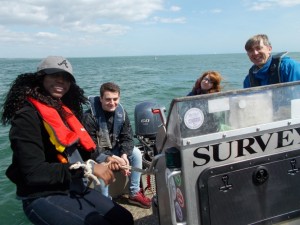
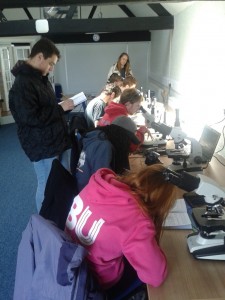
Students on board Sea Rush sampling plankton with BU marine biologists Dr. Dan Franklin and visiting Prof. John Humphreys (jhc Research and Poole Port Commissioner).
Examining the catch in the National Trust ‘Sail Loft’.
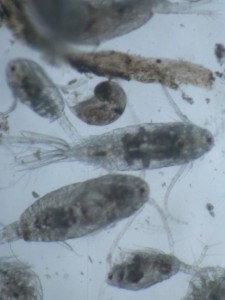
View down the microscope showing copepods. On hand was BU Alumni and local plankton expert Andrew Powell from Poole Harbour Study Group.
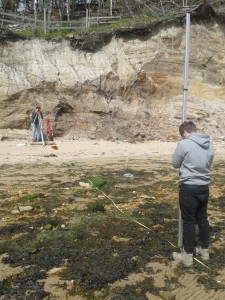
Surveying beach profiles on the south-west coast.
Important aims of the Observatory are to create a web-based an inventory of marine life of the harbour and to publish reports and papers that record and interpret environmental change.
For further information contact Dr. Roger Herbert, Department of Life and Environmental Sciences.
rherbert@bournemouth.ac.uk
Research Councils publish Delivery Plans for 2016-2020
![]() The UK Research Councils have published their Delivery Plans for the period 2016-2020.
The UK Research Councils have published their Delivery Plans for the period 2016-2020.
The plans outline how the Research Councils individually and collectively will use their allocations from the Science and Research Budget announced in March to meet their strategic aims and to support the research base to benefit the economy and wider society.
Each Research Council plan is available on their individual websites:
- AHRC – http://www.ahrc.ac.uk/newsevents/news/delivery-plan-2016-20/
- BBSRC – http://www.bbsrc.ac.uk/news/policy/2016/160504-n-bbsrc-publishes-delivery-plan/
- EPSRC – https://www.epsrc.ac.uk/newsevents/news/scienceforsuccessfulnationdeliveryplan/
- ESRC – http://www.esrc.ac.uk/news-events-and-publications/publications/corporate-publications/delivery-plan/
- MRC – http://www.mrc.ac.uk/about/spending-accountability/delivery-plan/
- NERC – http://www.nerc.ac.uk/about/perform/reporting/reports/
- STFC – http://www.stfc.ac.uk/about-us/our-purpose-and-priorities/delivery-plan/
The RCUK Executive Directorate has published a Delivery Plan for the first time which is available here . The Executive Directorate was established a year ago from the former RCUK Strategy Unit to give leadership for the collective activities across the Research Councils and to support the individual Councils to focus on their disciplines and communities. The Directorate’s Delivery Plan outlines future plans for policy and analysis, international, communications and public engagement, the Global Challenges Research Fund and the RCUK Change Programme.
In addition to outlining individual priorities for this period the Research Council Delivery Plans provide information on collective commitments to reform of the Research Councils, equality and diversity, partnership with Innovate UK and the Global Challenges Research Fund.
A helpful summary of each councils delivery plan is provided by Research Professional.
Business networking session – virtual and augmented reality
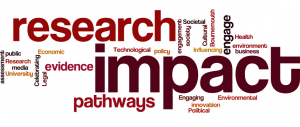
A networking session will take place on 23 May as part of “Impact Week, with the aim of to taking a closer look at how research can have an impact and make a difference beyond academia, and the ways in which this can be achieved. Developing relationships with external organisations in order to form partnerships and collaborations are just one such way in which to recognise potential “need” for research.
This is a themed networking session: H2H – bringing research to life (Human2Human). A business networking event on the topic of virtual and augmented reality
Time: 14.30-16.00
Location: PG10 – Talbot campus
Event description:
Virtual and augmented reality offers users new ways of perceiving and interacting with the digital world. Not limited to the entertainment sectors, this approach can be adopted for both technical and industrial contexts.
This drop in session provides an opportunity to find out more about the topic and approaches currently being undertaken both within and outside the university. Attendees will have the opportunity to network with academics from BU and local industry partners that may already be involved in projects or are keen to develop collaborations within this area.
Find out more and book now via Eventbrite
14: live – EU, are you in or out?
14:Live is back, but with a twist! Dr Dan Jackson, whose research includes political communication, how news is constructed and news coverage of politics, will be hosting a debate between two teams of students arguing for and against staying in the European Union.
Join us to find out more about the upcoming European referendum and share your views about whether Britain should be in or out.
14:Live will take place on the 5th floor of the Student Centre on 17 May at 2pm. Drinks and snacks will be available.
If you have any questions on the topic that you would like answered during the event, can you please send your questions to Oliver Cooke.
If you would like to attend this event, please can you email Oliver Cooke with confirmation that you will be attending.
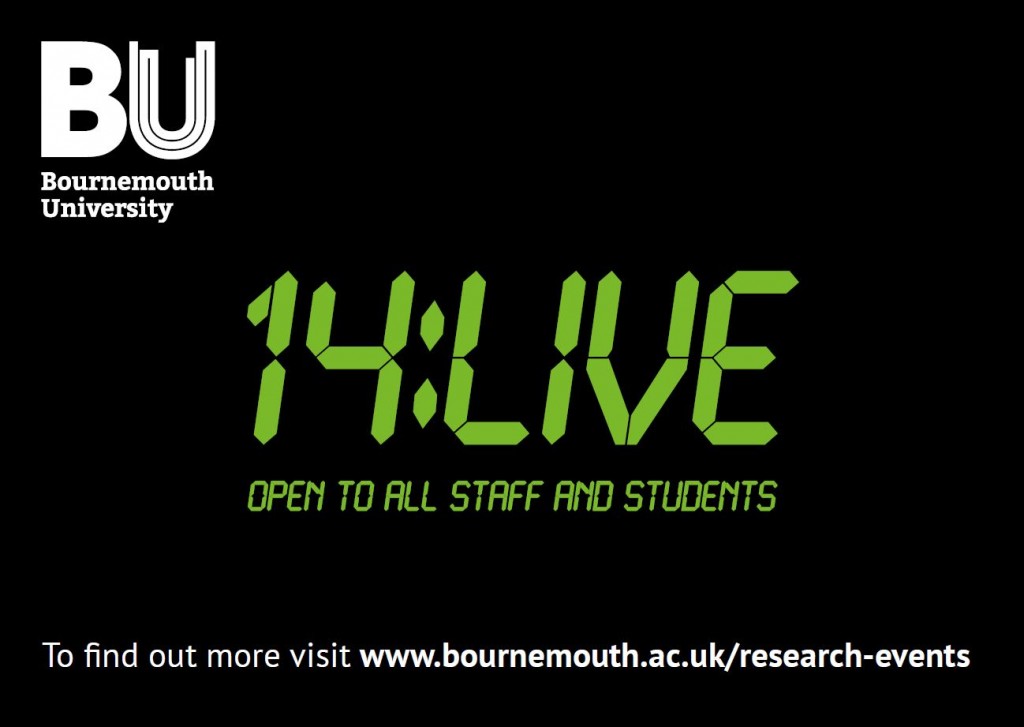
Lots to celebrate with RUFUS STONE
Excitement as anniversaries loom and RUFUS STONE is involved in all of it!
- Excitement as anniversaries loom and RUFUS STONE is involved in all of it! 10th Anniversary of the LGBT tent at Glastonbury this summer where our film will feature.
- Next, a proposal for a 5th Anniversary of the premiere of RUFUS STONE is in the mix for next November at the Shelley Theatre in Bournemouth.
- Finally, BBC will be using our research to inform a new BBC Two film marking 50 years since the passage of the 1967 Sexual Offences Act (making homosexuality in the UK no longer punishable as a crime).
Stay tuned for further details about these events!
BU research on Citizen Science featured on Countryfile
A recently screened and still available episode of the BBC programme Countryfile http://www.bbc.co.uk/iplayer/episode/b079ywf9/countryfile-conservation-compilation features BU PhD student Gitte Kragh’s research on what motivates members of the public and students to volunteer as Citizen Scientists for wildlife conservation. The programme showcases the National Trust’s Cyril Diver project, a nationally important project that has measured how the stunning wildlife of Studland, South Haven Peninsula on Purbeck has changed since it was recorded in detail by Cyril Diver in the 1930’s Gitte’s work has shown that the main motivation for people to participate in projects like the Cyril Diver is that they want to do something they feel is worthwhile, in this case help to protect the environment to ensure it is there for future generations. Another important aspect that draws volunteers to the Cyril Diver project is the opportunity for volunteers to learn more about nature, both through specialist workshops and through training in the field with expert naturalists.
Bournemouth University has been a close partner on the Cyril Diver project resulting in the co-creation of research by three BU PhD students, three MSc students, a dozen UG students and over 40 Student Environment Research Team (SERT) students. This work is informing future wildlife conservation management planning for Studland. BU and the NT are building on the success of the FIF-funded SERT co-creation work to develop our partnership model into a long term project for co-creating research of impact for wildlife conservation management that intergrates student and general public citizen scientists. For more information please contact Dr Anita Diaz adiaz@bournemouth.ac.uk
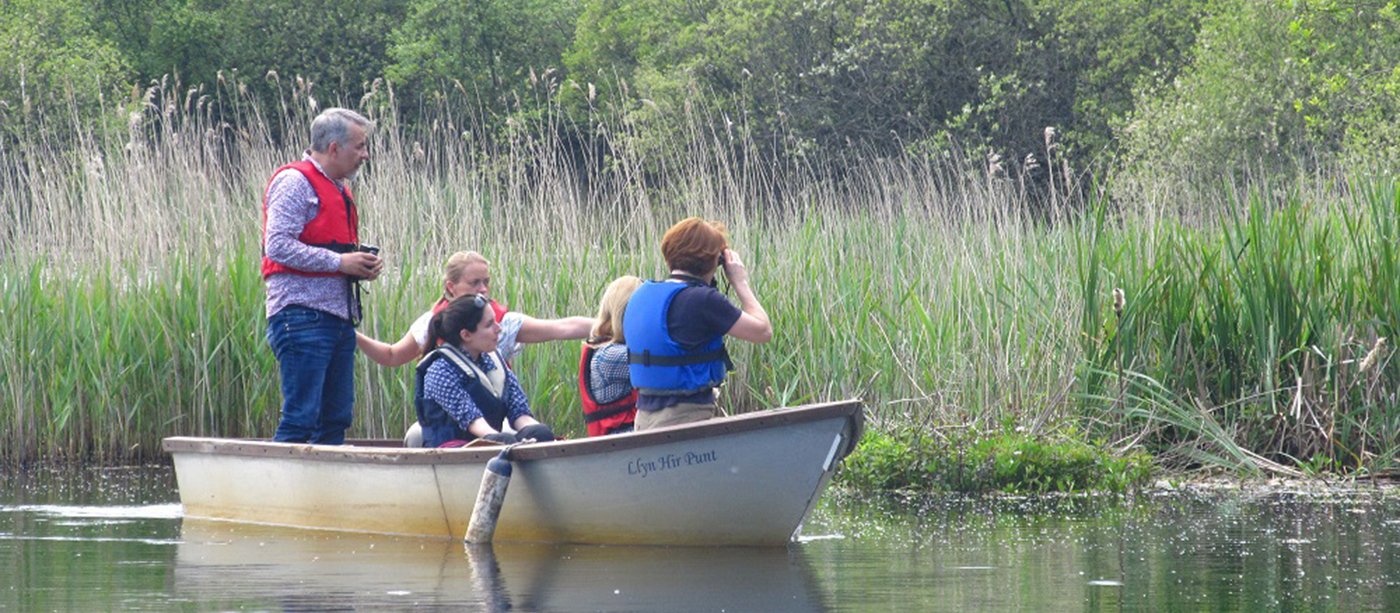
International launch of ERC Hyksos Enigma project at ICAANE conference
Last week, the Austrian Academy of Science hosted the 10th International Congress on the Archaeology of the Ancient Near East (ICAANE) on its magnificent premises in the heart of Vienna. A whole day was dedicated to the international launch of the ERC advanced grant The Hyksos Enigma, for which the Austrian Academy and Bournemouth University are co-beneficiaries, combined with a state-of-the-art review of research on the most significant site of the Hyksos, their capital Avaris/Tell el-Dab’a in the eastern Nile Delta. This was an important day to show Bournemouth’s presence and to promulgate its research in the bioarchaeology of the Hyksos, engage in extensive networking with associates and partners of the project, and to establish new links in support of Bournemouth’s role in the project. Regular updates will now appear on the new project website (http://thehyksosenigma.oeaw.ac.at/).
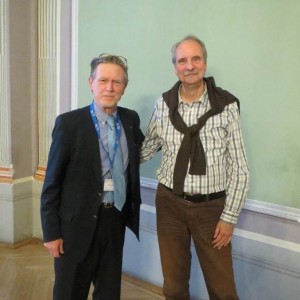
Prof Manfred Bietak (left), project lead, Institute for Oriental and European Archaeology at the Austrian Academy of Sciences, and Prof Holger Schutkowski, Co-PI, Department of Archaeology, Anthropology and Forensic Science.
New frontiers on tech – big data, the cloud and Internet of Things

Horizon 2020 – Health – 7th & 8th July 2016, Brussels
Health, Demographic Change & Wellbeing
Challenge in Horizon 2020
Do you intend to prepare a proposal for the 2017 call in Horizon 2020 for Health?
On the 8th of July 2016, the European Commission is organizing an Open Info Day dedicated to “Health, Demographic Change & Wellbeing (SC1)” challenge in Horizon 2020 and focusing on the 2017 call.
One day before, on the 7th of July 2016, Health NCP Net 2.0 and Fit for Health 2.0 are organizing a free of charge Partnering event meant to assist you in finding the right partners for the upcoming 2017 calls. The launch of the 2017 call is planned for the 29th of July 2016, having the first deadline on the 4th of October 2016, therefore this would be a good opportunity for your institution to identify the proper consortium partners.
Priority in participation, on 7th July, will be granted to entrepreneurs and research organizations with identified expertise profiles and project applications initiatives. As participation is limited to 2 persons representing the same department/organization, please contact RKEO so that we can co-ordinate registration on this event.
If you are attending both days, separate registration will be needed As far as we are aware, there is no restriction on numbers from each organisation for the Info Day on 8/7/16.
BROKERAGE EVENT

Find cooperation partners for the upcoming H2020 health calls.
PRESENT YOUR PROJECT

Present your project in a 5 min flash presentation to a highly commited audience
7 July 2016 – Fit for Health 2.0 and Health-NCP-Net 2.0
Horizon 2020 Health Partnering Day
This Partnering event will be dedicated to consortium building. The main part of the day is dedicated to bilateral meetings between persons interested in the same call area.
A surrounding programme will provide information on support measures for Health projects and give researchers and entrepreneurs from the Health and ICT areas a platform to present their project ideas in 5-minute presentations.
Bilateral meetings will be arranged automatically by a sophisticated, user-friendly match-making tool following indication of interests in specific call areas by participants. Additionally, to bilateral meetings among potential project partners, participants will have the option to meet with representatives of support initiatives and members of the organizing projects for personalized support and information.
Focus
This Partnering event will target a wide spectrum of companies, universities and researchers from Europe and beyond interested in sharing new project ideas and finding collaboration partners and will be focused on the following challenge of the Horizon 2020 Health Call.
Main topics
- Understanding health, well-being & disease
- Preventing disease
- Treating and managing diseases
- Active ageing and self-management of health
- Methods and data
- Coordination activities
- Social Sciences and Humanities (SSH) in health projects
- Sustainable food security – health aspects
Why to participate
- to facilitate the setup of Horizon 2020 project consortia
- to present, discuss and develop new project ideas on Health at an international level
- to initiate cross-border contacts
EURAXESS – Marie Skłodowska-Curie
Please see the following announcement just received from EURAXESS:
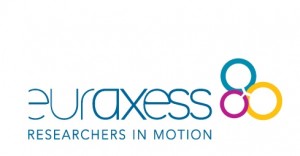
Dear researchers,
As you know, the Marie Skłodowska Curie Action-Individual Fellowships (MSCA-IF) call was launched on the 12th April. With the collaboration of SRUK/CERU (Society of Spanish Researchers in the UK), at RUVID we have organised a webinar on Friday 6th May between 9 am and 11 am to present 12 research groups from our Valencian universities as potential host institutions for young researchers and candidates for this MSCA-IF call.
Each of the 12 researchers will give a ten minute presentation on their research group, main research area(s) and the profile of the candidate they are looking for.
These groups cover different fields: Physics, Life Sciences, Information Science & Engineering, and Social Sciences. Please see the detailed programme of the webinar – Webinar Presentation of Host Institutions inValencia_06-05-2016
This is a unique opportunity for you to find your host institution.
If you have completed your PhD or have 4 years full-time experience as a researcher, this webinar is for you.
Don’t miss it and register at: bit.ly/1Y2NvQN
We are also promoting this event on social media, using the following hastags: #MSCA #IF #MarieCurieFellowship
For more information, feel free to contact Joumana at jsweiss@ruvid.org
Dating one of the oldest settlements in the world-new results from WF16, Jordan
Last week saw the publication of a new paper entitled: Dating WF16: Exploring the Chronology of a Pre-Pottery Neolithic A Settlement in the Southern Levant in the Proceedings of the Prehistoric Society (London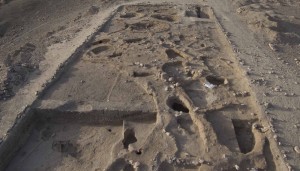 ). This was published by BU staff member Emma Jenkins who is a Senior Lecturer in Archaeology and colleagues from the University of Reading and Oxford Brookes University. This is a significant paper which presents 46 AMS Radiocarbon dates from the site and utilizes Bayesian methods to try and establish a chronology for WF16, one of the earliest settlements in the world which is located in southern Jordan. The excavation was unique in its size and scope for a site of this time period and in the number of AMS dates obtained. This paper makes an important contribution to our understanding of the Neolithic in the Levant-a time and place which saw the transition from mobile hunter-gatherers to settled farming communities. The paper is published Gold Open access and is available here: http://eprints.bournemouth.ac.uk/23519/
). This was published by BU staff member Emma Jenkins who is a Senior Lecturer in Archaeology and colleagues from the University of Reading and Oxford Brookes University. This is a significant paper which presents 46 AMS Radiocarbon dates from the site and utilizes Bayesian methods to try and establish a chronology for WF16, one of the earliest settlements in the world which is located in southern Jordan. The excavation was unique in its size and scope for a site of this time period and in the number of AMS dates obtained. This paper makes an important contribution to our understanding of the Neolithic in the Levant-a time and place which saw the transition from mobile hunter-gatherers to settled farming communities. The paper is published Gold Open access and is available here: http://eprints.bournemouth.ac.uk/23519/
Innovation awards – Partnership for Conflict, Crime and Security Research (PaCCS) – new call to be announced

Innovation awards under PaCCS focusing on Conflict and International Development
The ESRC and AHRC will shortly be launching a further call for interdisciplinary innovation awards under the Partnership for Conflict, Crime and Security Research (PaCCS) focusing on Conflict and International Development. (Pre-call.)
Find out more information including the proposed call timescale here.
If you are interested in submitting to this call you must contact your RKEO Funding Development Officer with adequate notice before the deadline.
For more funding opportunities that are most relevant to you, you can set up your own personalised alerts on Research Professional. If you need help setting these up, just ask your School’s/Faculty’s Funding Development Officer in RKEO or view the recent blog post here.
If thinking of applying, why not add notification of your interest on Research Professional’s record of the bid so that BU colleagues can see your intention to bid and contact you to collaborate.
‘Meet the Entrepreneur’ – Damien Lee
The Business School and Centre for Entrepreneurship were delighted to welcome Damien Lee to the EBC yesterday for the fourth in our series of ‘Meet the Entrepreneur’ seminars.
Damien Lee, founder of Mr Lee’s Noodles Company Ltd, is an adventurous and focused entrepreneur with a vision to create affordable, healthy fast food options, particularly for young people.
Mark Painter, Business Development Manager for The Business School, said, ‘Damien has founded and run many successful businesses across a diverse range of sectors including oil, leisure and recruitment’, Mark added, ‘It was particularly interesting to hear Damien say that creating a business is ultimately about making money, however, at the same time, Damien believes enterprises should ensure they give something worthwhile back to those societies and communities they serve’.
A cancer survivor – once told “he only had weeks” – and a fervent believer in the role of food in health. Damien is passionate about supporting young people and through Mr Lee’s HEY Foundation aims to raise awareness of the importance of eating good food (Health), provide life coaching (Educate) and encourage young people to get active and set personal goals (Youth).
This was a great opportunity for students and staff to hear about Damien’s personal journey as an entrepreneur and learn more about his own experiences as a business owner and his approach to founding and growing an innovative business.
In recognition of Damien’s support for BU’s enterprise activities, at the end of the seminar Mark Painter invited Damien to join the Centre for Entrepreneurship’s cohort of Entrepreneurs in Residence. Mark Painter said, ‘I’m delighted that Damien is able to join our group of Entrepreneurs in Residence and we very much look forward to seeing Damien at further events in the future.’
More information about Mr Lee’s Noodles Company Ltd can be found at www.mrleesnoodles.com
Details of future events being organised by the Centre for Entrepreneurship can be found at www.bucfe.com
Seminar by Prof Sue Denham in Cogntive and Computational Neuroscience. Today the 5th of May at 15h, Lawrence Lecture Theatre.
Sue Denham, PhD in Physics holds a Professorship in Cognitive Neuroscience at the department of Psychology in Plymouth University and is director of the Cognition Institute https://www.plymouth.ac.uk/research/institutes/cognition
Prof Denham has published a series of influential studies in the area of auditory cognition both from empirical and neurocomputational modelling angles. In addition, she has applied these insights in the development of computationally efficient implementations for practical technological applications, and in the creation of novel devices. Sue has been funded multiple times from BBSRC, EPSRC, Leverhulme, Welcome Trust and ERC among other funding agencies; and has been coordinator of three FP7 European projects. Currently she is the coordinator of the EU FP7 Marie Curie Initial Training Network (FP7-PEOPLE-2013-ITN-IDP 604764; €4.1m) “CogNovo: Cognitive Innovation” (2013-2017).
The title of her exciting talk is: “What can perceptual multistability tell us about perception?”, in Lawrence Lecture Theatre today, the 5th of May, 15h, in the context of the Psychology Department Seminars organized by Dr Sebastien Miellet, Head of the Cognition and Cognitive Neuroscience Research Center.
Abstract: “The phenomenon of perceptual multistability, i.e. qualitative changes in perception in response to an unchanging stimulus, has been known for many years, originally in the form of binocular rivalry. More recently, perceptual switching has also been observed in other visual tasks (e.g. form from motion, visual plaids, Necker cube) and modalities, notably in the two auditory paradigms of auditory streaming and verbal transformations, both of which give rise to multistable states. Perceptual multistability poses many interesting questions for theories and models of sensory perception, and provides ways to explore the neural correlates of differences in (conscious) perceptual awareness without confounds caused by differences in stimulation or individual. In this talk I will discuss the somewhat surprising similarities between visual and auditory perceptual switching data, illustrated through Levelt’s four propositions. These suggest a common modelling strategy which in turn leads to new ideas of what constitutes an auditory object”.
We are all looking forward to her talk which is interesting for many of us at BU since Sue has worked in areas ranging from cognition to neural computation.
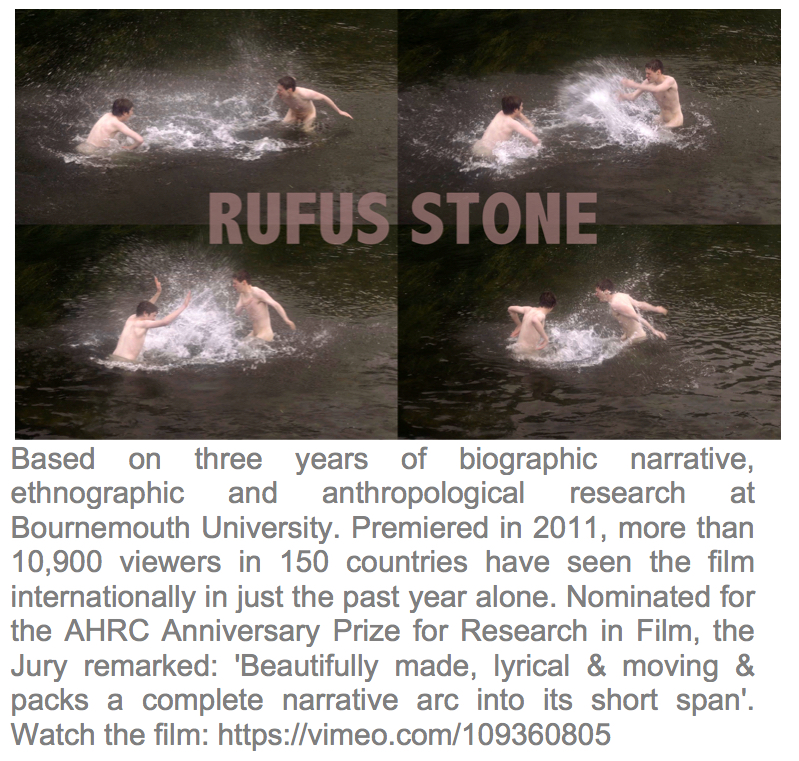











 BU paper among top 20 most cited papers
BU paper among top 20 most cited papers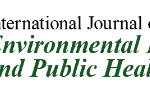 Nepal migrant workers returning from India
Nepal migrant workers returning from India New BU midwifery publication
New BU midwifery publication MSCA Postdoctoral Fellowships 2025 Call
MSCA Postdoctoral Fellowships 2025 Call ERC Advanced Grant 2025 Webinar
ERC Advanced Grant 2025 Webinar Horizon Europe Work Programme 2025 Published
Horizon Europe Work Programme 2025 Published Horizon Europe 2025 Work Programme pre-Published
Horizon Europe 2025 Work Programme pre-Published Update on UKRO services
Update on UKRO services European research project exploring use of ‘virtual twins’ to better manage metabolic associated fatty liver disease
European research project exploring use of ‘virtual twins’ to better manage metabolic associated fatty liver disease